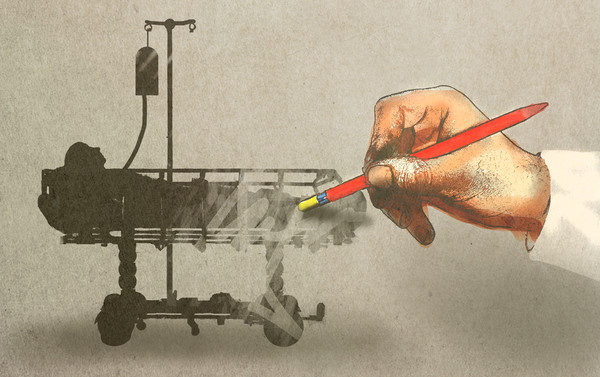The nation’s largest physician group expressed serious concerns over enacting the so-called “doctor-assisted death with dignity” law.
The Korean Medical Association (KMA) said such a law would confuse insufficient social discussion and consensus. It could also increase the risk of allowing “legal suicides,” the group warned.

The KMA collected physicians’ opinions about an amendment to the Act on Health Care Decisions on Patients' and Hospice Palliative Care and Withdrawing Life-Sustaining Treatment. Then, the group delivered the opinions to the National Assembly and the Ministry of Health and Welfare on Friday.
Rep. Ahn Gyu-back of the opposition Democratic Party proposed the bill to recognize doctor-assisted suicide and exempt the helping doctor from criminal charges of aiding a suicide.
The KMA pointed out that Korean people have yet to discuss assisted suicide sufficiently.
“There are diverse social views on death with dignity and euthanasia, and social debates are still ongoing between those emphasizing the right to death and those supporting ethics. We don’t have a social consensus on this issue,” the KMA said. “Thus, it is too early to make a law to allow assisted suicide.”
Instead of a law revision, the KMA proposed preparing a related system to expand the scope of hospice and palliative care to improve patients’ quality of life and provide psychiatric and psychosocial support.
“We must provide high-quality counseling for life-sustaining treatment and broaden social support. The government may consider policies that improve the quality of the latter part of life for patients,” the KMA said.
The KMA also pointed out that Ahn’s revision bill did not have evidence to make the composition of the Assisted Death with Dignity Review Committee legitimate.
Headed by Health and Welfare Minister, the committee consists of a high-ranking government official, a person with rich experience in assisted suicide, and experts in ethics and psychology.
The doctors’ group questioned whether the nation had any experts in assisted suicide.
The KMA also doubted the health minister and a high-ranking government official’s ability to judge the subject of assisted suicide.
“There is also a high risk that the committee could make a wrong decision to allow legal suicides without objective evaluations,” the KMA said.
The physicians’ group said the nation did not have any countermeasure to protect a doctor who assists suicide.
Although the revision bill aims to exclude such doctors from the criminalization of helping suicide but assisted suicide’s legal definition is ambiguous between murder and suicide, the KMA said.
Even if physicians can be exempt from the charge of aiding suicide, various legal, ethical, family, civil, and religious problems may emerge, and the nation needs multifaceted reviews and countermeasures, it added.
The KMA claimed that the so-called Life-Sustaining Treatment Determination Act, passed in 2018, was already problematic because it all included life-sustaining treatment, hospice, and palliative care.
“Adding assisted suicide will hamper the consistency of the law and cause confusion for physicians and people,” the KMA said. It added that the revision bill also conflicts with the Suicide Prevention Act.
The KMA said the amendment defines “people eligible for assisted death with dignity” as terminally-ill patients, but “terminally-ill patient” has no social or medical definition.
The Korean society should first unify the definitions of various terms -- such as death with dignity, euthanasia, suspension of life-sustaining treatment, and assisted death – that respect the right to die, the KMA said.

